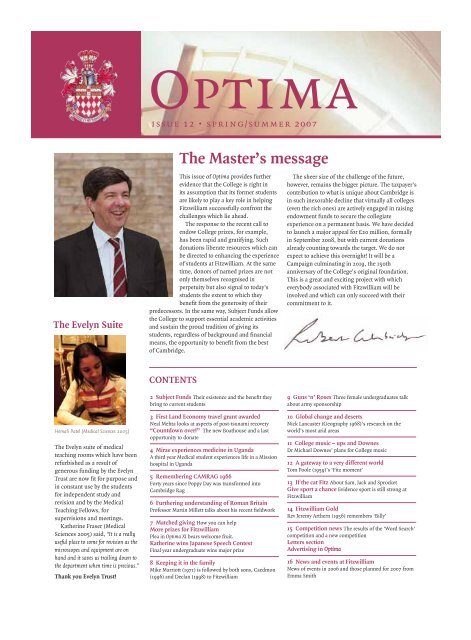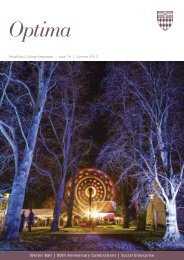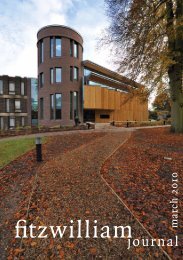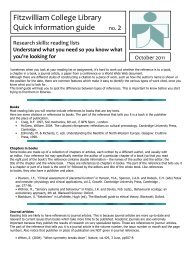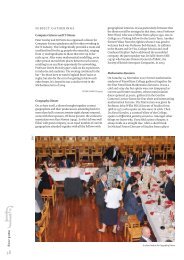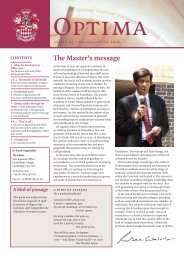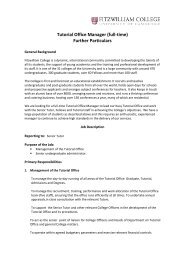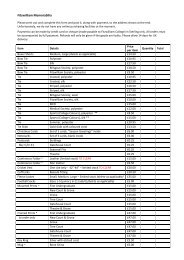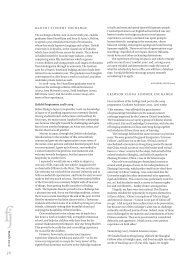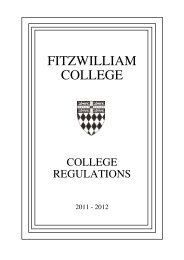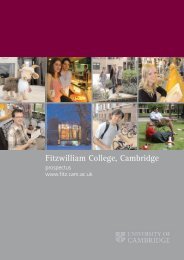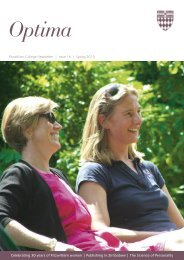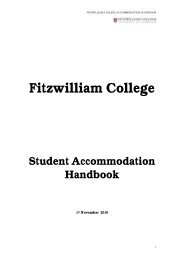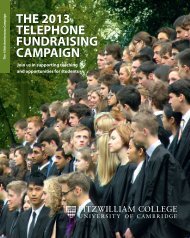Optima 12 - Fitzwilliam College - University of Cambridge
Optima 12 - Fitzwilliam College - University of Cambridge
Optima 12 - Fitzwilliam College - University of Cambridge
Create successful ePaper yourself
Turn your PDF publications into a flip-book with our unique Google optimized e-Paper software.
The Evelyn Suite<br />
Hemali Patel (Medical Sciences 2005)<br />
The Evelyn suite <strong>of</strong> medical<br />
teaching rooms which have been<br />
refurbished as a result <strong>of</strong><br />
generous funding by the Evelyn<br />
Trust are now fit for purpose and<br />
in constant use by the students<br />
for independent study and<br />
revision and by the Medical<br />
Teaching Fellows, for<br />
supervisions and meetings.<br />
Katherine Fraser (Medical<br />
Sciences 2005) said, “It is a really<br />
useful place to come for revision as the<br />
microscopes and equipment are on<br />
hand and it saves us trailing down to<br />
the department when time is precious.”<br />
Thank you Evelyn Trust!<br />
<strong>Optima</strong><br />
issue <strong>12</strong> • spring/summer 2007<br />
This issue <strong>of</strong> <strong>Optima</strong> provides further<br />
evidence that the <strong>College</strong> is right in<br />
its assumption that its former students<br />
are likely to play a key role in helping<br />
<strong>Fitzwilliam</strong> successfully confront the<br />
challenges which lie ahead.<br />
The response to the recent call to<br />
endow <strong>College</strong> prizes, for example,<br />
has been rapid and gratifying. Such<br />
donations liberate resources which can<br />
be directed to enhancing the experience<br />
<strong>of</strong> students at <strong>Fitzwilliam</strong>. At the same<br />
time, donors <strong>of</strong> named prizes are not<br />
only themselves recognised in<br />
perpetuity but also signal to today’s<br />
students the extent to which they<br />
benefit from the generosity <strong>of</strong> their<br />
predecessors. In the same way, Subject Funds allow<br />
the <strong>College</strong> to support essential academic activities<br />
and sustain the proud tradition <strong>of</strong> giving its<br />
students, regardless <strong>of</strong> background and financial<br />
means, the opportunity to benefit from the best<br />
<strong>of</strong> <strong>Cambridge</strong>.<br />
CONTENTS<br />
The Master’s message<br />
2 Subject Funds Their existence and the benefit they<br />
bring to current students<br />
3 First Land Economy travel grant awarded<br />
Neal Mehta looks at aspects <strong>of</strong> post-tsunami recovery<br />
“Countdown over!” The new Boathouse and a last<br />
opportunity to donate<br />
4 Mirae experiences medicine in Uganda<br />
A third year Medical student experiences life in a Mission<br />
hospital in Uganda<br />
5 Remembering CAMRAG 1966<br />
Forty years since Poppy Day was transformed into<br />
<strong>Cambridge</strong> Rag<br />
6 Furthering understanding <strong>of</strong> Roman Britain<br />
Pr<strong>of</strong>essor Martin Millett talks about his recent fieldwork<br />
7 Matched giving How you can help<br />
More prizes for <strong>Fitzwilliam</strong><br />
Plea in <strong>Optima</strong> XI bears welcome fruit.<br />
Katherine wins Japanese Speech Contest<br />
Final year undergraduate wins major prize<br />
8 Keeping it in the family<br />
Mike Marriott (1971) is followed by both sons, Caedmon<br />
(1996) and Declan (1998) to <strong>Fitzwilliam</strong><br />
The sheer size <strong>of</strong> the challenge <strong>of</strong> the future,<br />
however, remains the bigger picture. The taxpayer’s<br />
contribution to what is unique about <strong>Cambridge</strong> is<br />
in such inexorable decline that virtually all colleges<br />
(even the rich ones) are actively engaged in raising<br />
endowment funds to secure the collegiate<br />
experience on a permanent basis. We have decided<br />
to launch a major appeal for £20 million, formally<br />
in September 2008, but with current donations<br />
already counting towards the target. We do not<br />
expect to achieve this overnight! It will be a<br />
Campaign culminating in 2019, the 150th<br />
anniversary <strong>of</strong> the <strong>College</strong>’s original foundation.<br />
This is a great and exciting project with which<br />
everybody associated with <strong>Fitzwilliam</strong> will be<br />
involved and which can only succeed with their<br />
commitment to it.<br />
9 Guns ‘n’ Roses Three female undergraduates talk<br />
about army sponsorship<br />
10 Global change and deserts<br />
Nick Lancaster (Geography 1968)’s research on the<br />
world’s most arid areas<br />
11 <strong>College</strong> music – ups and Downes<br />
Dr Michael Downes’ plans for <strong>College</strong> music<br />
<strong>12</strong> A gateway to a very different world<br />
Tom Poole (1959)’s ‘Fitz moment’<br />
13 If the cat Fitz About Sam, Jack and Sprocket<br />
Give sport a chance Evidence sport is still strong at<br />
<strong>Fitzwilliam</strong><br />
14 <strong>Fitzwilliam</strong> Gold<br />
Rev Jeremy Arthern (1956) remembers ‘Billy’<br />
15 Competition news The results <strong>of</strong> the ‘Word Search’<br />
competition and a new competition<br />
Letters section<br />
Advertising in <strong>Optima</strong><br />
16 News and events at <strong>Fitzwilliam</strong><br />
News <strong>of</strong> events in 2006 and those planned for 2007 from<br />
Emma Smith
subject funds • 2<br />
Subject Funds<br />
<strong>Fitzwilliam</strong> admits students to read all the subjects currently on <strong>of</strong>fer at<br />
<strong>Cambridge</strong>. Twenty-three are listed in the <strong>College</strong> prospectus, alphabetically<br />
from Anglo Saxon, Norse and Celtic to Theology and each has a <strong>College</strong>-based<br />
Director <strong>of</strong> Studies. Six have their own Subject Funds: Engineering, Geography,<br />
Land Economy, Law, Medicine, and Medieval and Modern Languages (MML).<br />
Each Fund has been set up at a different time and has a slightly different remit,<br />
but they have all been established as a result <strong>of</strong> the generosity <strong>of</strong> former students<br />
<strong>of</strong> the <strong>College</strong>. The money raised is invested and awards made, from the interest<br />
earned, to current students, to support them in preparation for Tripos or to help<br />
fund subject-related activities <strong>of</strong> a broader kind.<br />
Jessie White<br />
You have reached where<br />
you are today due to your<br />
privileged <strong>Fitzwilliam</strong> start.<br />
Please give generously to<br />
<strong>Fitzwilliam</strong> Subject Funds by<br />
turning to the centre pages<br />
<strong>of</strong> this issue <strong>of</strong> <strong>Optima</strong>.<br />
The longest running Subject Fund is the Cuthbert-<br />
Edwards Fund for Medicine while the most recent<br />
is Land Economy, launched in 2005.<br />
The percentage <strong>of</strong> Members supporting their own<br />
subject varies with MML currently leading the<br />
field, with nearly fourteen percent <strong>of</strong> those Members<br />
who studied the subject giving to the Fund by 2006.<br />
The value to our students is obvious. Almost<br />
every issue <strong>of</strong> <strong>Optima</strong> pr<strong>of</strong>iles a student happy to<br />
relate their adventures and who has benefited<br />
from donated funds. In the last issue (<strong>Optima</strong> XI)<br />
Wil Mossop (Law 2004) talked about the value <strong>of</strong><br />
the Law Book Fund, saying “The Law Book Fund is<br />
an invaluable scheme which has enabled me to maintain<br />
a healthy level <strong>of</strong> study and a healthy bank balance while<br />
I have been at <strong>Fitzwilliam</strong> <strong>College</strong>”.<br />
The first ever Land Economy grant has just<br />
been awarded to Neal Mehta and a report <strong>of</strong> his<br />
experience follows on page 3. Jessie White (MML<br />
2006) recently spent two weeks <strong>of</strong> her Christmas<br />
vacation at an intensive French Language course<br />
in Bordeaux in preparation for her oral<br />
examinations, courtesy <strong>of</strong> the MML Fund. She<br />
said, “I’m so grateful for the money I received towards<br />
my course – I couldn’t have gone without the funding, as<br />
it was so expensive, but I’m really glad I did. It was such<br />
an amazing experience and I feel much more confident<br />
speaking French now. I think it’s a wonderful thing that<br />
<strong>Fitzwilliam</strong> <strong>of</strong>fers MML travel grants like these.”<br />
The Geographers, as you would imagine, travel<br />
all over the world aided by grants to help with<br />
their final year<br />
dissertation research.<br />
Henry Leivers<br />
(Geography 2004)<br />
spent his long<br />
vacation in India and<br />
says, “The grants I<br />
received, for which I<br />
am extremely grateful,<br />
made possible a unique,<br />
stimulating experience<br />
that has provided me<br />
with memories and skills<br />
that will stay with me<br />
for life”.<br />
<strong>Fitzwilliam</strong> <strong>College</strong> is an Exempt Statutory Charity (Inland Revenue No. x11732)<br />
Henry with a child in northern Varanasi<br />
James carrying out his research in Berlin<br />
James Ronicle (Geography 2004) is shown<br />
interviewing people in Berlin to gather material<br />
for his final year project and says, “The travel grant<br />
helped me carry out research and have experiences that I<br />
would not have had the opportunity to do otherwise and<br />
for that I am eternally grateful.”<br />
Mirae Shin (Medical Sciences 2004) spent time<br />
last summer helping at a local health centre in<br />
Uganda, helped by the Cuthbert-Edwards Fund<br />
and her experiences are documented on page 4.<br />
These reports represent just the tip <strong>of</strong> the<br />
iceberg <strong>of</strong> those students who received financial<br />
help with travel for dissertation research, for<br />
vocational purposes or to attend courses necessary<br />
to their study, all because the <strong>College</strong> has been<br />
given the means to help them.<br />
More Subject Funds are in the pipeline.<br />
Natural Sciences and Mathematics are being<br />
actively pursued. The Subject Funds take the<br />
pressure <strong>of</strong>f <strong>College</strong> Travel Awards and represent<br />
a direct means by which you can put something<br />
back in your own field and see today’s students<br />
progress in the very subject which you enjoyed and<br />
gave you a foothold into your current pr<strong>of</strong>ession.
First Land Economy Travel Grant awarded<br />
In April 2005, Dr Derek Nicholls, Director <strong>of</strong> Studies in Land Economy,<br />
launched a Fund for Land Economy. One <strong>of</strong> its aims was to accrue<br />
funds for students to travel widely in association with their research.<br />
The first Land Economy grant was awarded to Neal Mehta (2004) for<br />
his expedition to South East Asia in September 2006 to look at aspects<br />
<strong>of</strong> post-tsunami recovery.<br />
Phi Phi Don Island<br />
Thanks are due to those who<br />
came forward to donate to the<br />
Land Economy Fund and allow<br />
students like Neal experience<br />
first hand the areas chosen for<br />
their dissertation research. If<br />
you read Land Economy and<br />
would like to contribute to the<br />
Fund please turn to the centre<br />
pages <strong>of</strong> <strong>Optima</strong>.<br />
Belated congratulations to Sarah<br />
Winckless (1993) and her crew<br />
for retaining their World<br />
Championship title at the end <strong>of</strong><br />
January. The Russian crew that<br />
originally beat them were<br />
subsequently disqualified due to<br />
a positive drugs test on one <strong>of</strong><br />
their members and the British<br />
team moved up from the silver<br />
position.<br />
Sarah wrote warmly in support<br />
<strong>of</strong> the Boathouse appeal in<br />
<strong>Optima</strong> VII, having traced her<br />
rowing origins to <strong>Fitzwilliam</strong>.<br />
In December 2004, a series <strong>of</strong> devastating<br />
tsunamis, caused by the Sumatra-Andaman<br />
undersea earthquake killed tens <strong>of</strong> thousands <strong>of</strong><br />
people and ruined the lives <strong>of</strong> millions, reduced<br />
homes to rubble, destroyed roads, fishing boats<br />
and caused some $10 billion <strong>of</strong> damage in barely<br />
24 hours. Neal travelled to Malaysia and Thailand<br />
to assess the scale <strong>of</strong> the disaster and look at posttsunami<br />
recovery for his dissertation research. He<br />
stayed at Phuket in Thailand, visiting Khao Lak,<br />
Krabi and the Phi Phi Islands and found the tourist<br />
industry slowly recovering with arrivals improving<br />
each season. He learned about the importance <strong>of</strong><br />
both charity and personal donations and how they<br />
are aiding clearing, rebuilding and debris removal.<br />
In Malaysia, he worked with people directly<br />
involved with the recovery process via contacts at<br />
the Universiti Teknologi Malaysia in Johor Bahru<br />
and was also able to talk to those involved with<br />
reconstruction in Banda Aceh in Indonesia. He<br />
also visited Kota Kuala Muda in Malaysia where<br />
the tsunami totally crippled the economy <strong>of</strong> the<br />
area which, up until then, had relied on fishing<br />
and paddy cultivation.<br />
Countdown over!<br />
For the Chinese, it is the year <strong>of</strong> the pig. For our<br />
oarsmen, past and present, it is the year <strong>of</strong> the<br />
new Boathouse! A contract has been placed with<br />
Marriott Construction, the company responsible<br />
for building Gatehouse Court and the auditorium.<br />
Work commenced in March 2007 while rowing<br />
continues from elsewhere. The Billygoats wished a<br />
fond farewell to the boathouse when demolition<br />
started.<br />
Demolition begun<br />
<strong>Fitzwilliam</strong> <strong>College</strong> is an Exempt Statutory Charity (Inland Revenue No. x11732)<br />
Now aware <strong>of</strong> the threat<br />
<strong>of</strong> tsunamis, many areas have<br />
instigated early warning<br />
systems and evacuation<br />
procedures and hold regular practice drills. Yellow<br />
evacuation signs were visible around every corner<br />
in Phuket as constant reminders <strong>of</strong> this. New<br />
houses have been built in many areas and in Kota<br />
Kuala Muda they are provided at 50% discount rate<br />
for disaster victims with more permanent houses<br />
being built and equipped all the time. Many <strong>of</strong> the<br />
contacts Neal established have promised to keep<br />
him up-to-date with the recovery process and the<br />
information will be used as the basis for his Final<br />
Year dissertation.<br />
Neal says: “My summer spent in South East Asia<br />
was an amazing experience and I am extremely grateful<br />
to all the people that contributed to the funds, that gave<br />
me this exceptional opportunity to study tsunami impact<br />
and recovery.”<br />
Cotlamlcuweuh – in Banda Aceh<br />
Billygoats raise their glasses<br />
Completion is scheduled for mid September<br />
in time for the Reunion row and the <strong>of</strong>ficial<br />
opening <strong>of</strong> the new Boathouse will take place at<br />
10.30am on Saturday 22 September during the<br />
Reunion weekend when many Members return<br />
to <strong>Cambridge</strong> anyway.<br />
We are keeping all our supporters up-to-date<br />
with progress and funds are very tight with less<br />
than 1% allowed in the overall budget <strong>of</strong> £584,000<br />
for contingencies. Some supporters have already<br />
kindly rallied to the cause. If you always had in<br />
mind to donate to the Boathouse appeal, but never<br />
quite got around to it, here is your chance, your<br />
last chance, to add your name to the list <strong>of</strong> one<br />
hundred and fifty plus supporters.<br />
Do it for Billy!<br />
land economy travel grant/countdown over • 3
mirae experiences medicine in uganda• 4<br />
Mirae experiences medicine in Uganda<br />
Mirae Shin, born in South Korea and brought up in England, is a third<br />
year medical student at <strong>Fitzwilliam</strong>. Last summer, she spent three and<br />
half weeks in Kabale, near the Rwandan border <strong>of</strong> Uganda working at<br />
the Rugarama Health Centre. The Mission Hospital is an important<br />
centre for malaria treatment and has a specialist unit for<br />
malnourished and premature babies (almost unique in Uganda). It<br />
was founded by the Church <strong>of</strong> Uganda and is supported additionally<br />
by a consortium <strong>of</strong> international churches.<br />
Premature babies in incubators<br />
In the last <strong>Optima</strong> issue, we<br />
featured the excellent medical<br />
and veterinary departments at<br />
<strong>Fitzwilliam</strong>. To help students<br />
like Mirae achieve their full<br />
potential, please consider<br />
donating to the Cuthbert-<br />
Edwards Fund. Details can be<br />
found in the centre giving<br />
pages <strong>of</strong> the magazine.<br />
Malaria is the biggest problem and is ubiquitous<br />
throughout the local community, partly due to<br />
poor education about the use <strong>of</strong> mosquito nets<br />
(far cheaper than anti-malarial drugs). The<br />
disease renders breadwinners unable to work,<br />
gives rise to severely underweight and premature<br />
babies, as well as being a major cause <strong>of</strong> infant<br />
mortality. Other prevalent diseases are<br />
tuberculosis, brucillosis and AIDS, although,<br />
interestingly, people are better informed about<br />
AIDS via awareness campaigns and World Health<br />
Organisation initiatives.<br />
There is a global commitment to reduce malaria<br />
which causes the loss <strong>of</strong> over a million lives each<br />
year, mainly children under five. 90% <strong>of</strong> the cases<br />
occur in sub-Saharan Africa. The good news is<br />
that results from recent trials <strong>of</strong> a new malaria<br />
vaccine, RTS, S/AS02A, which attacks the<br />
plasmodium sporozoite as it is injected<br />
into the blood by the mosquito, is<br />
proving effective. The Micros<strong>of</strong>t<br />
entrepreneur, Bill Gates, via the Bill<br />
and Melinda Gates Foundation, has<br />
given $250 million to accelerate the<br />
development <strong>of</strong> this promising drug.<br />
It is hoped that it will be licensed by<br />
2010 and the vaccine, along with other<br />
new therapies and the bi-annual<br />
spraying <strong>of</strong> villages to kill the mosquito vector,<br />
are helping reduce this deadly disease.<br />
Mirae’s day started at eight o’clock with<br />
Morning Prayer followed by a handover meeting<br />
between night and day staff and the assignment<br />
<strong>of</strong> ward rounds. As well as accompanying the<br />
doctors on rounds, she helped in the outpatient<br />
centre and, in the afternoon, assisted in the<br />
children’s centre. This ‘play house’ for young<br />
patients and visiting children was set up by two<br />
elective students the previous year and was<br />
equipped with donated toys. She also went to an<br />
outreach clinic in Ikamiro to help vaccinate babies<br />
against polio, tuberculosis, diphtheria, whooping<br />
cough and tetanus.<br />
Families are large in Uganda with seven to ten<br />
children the norm but some have as many as<br />
twenty. 85% <strong>of</strong> the population are Christian so<br />
marriage is celebrated and by sixteen, girls may<br />
already have a couple <strong>of</strong> children. Infant mortality<br />
<strong>Fitzwilliam</strong> <strong>College</strong> is an Exempt Statutory Charity (Inland Revenue No. x11732)<br />
is high. Although<br />
treatment at the<br />
Health Centre is<br />
mainly free, 80%<br />
<strong>of</strong> the Ugandan<br />
population choose<br />
traditional healers.<br />
The reason being<br />
that for every one<br />
hundred and fifty<br />
Ugandans, there is a<br />
practicing medicine<br />
man but only one<br />
medical doctor for<br />
every twenty<br />
thousand. While<br />
treatment using In the ‘play house’<br />
herbal medicine can<br />
be effective, use <strong>of</strong> other ‘tools’ by witch doctors<br />
such as coins, shells, sticks and animal fur, can<br />
have disastrous effects.<br />
Mirae recalls the admission <strong>of</strong> a five-month<br />
old baby with severe respiratory distress. The<br />
baby had been taken to a witch doctor for a mild<br />
cough. He had cut into the baby’s chest and<br />
pretended to pull a small shell from its throat.<br />
This had destroyed the tonsils on one side and<br />
led to severe swelling and throat infection. The<br />
cuts to the chest had also become infected. The<br />
baby was treated with glucocorticoids and<br />
antibiotics and survived. The hospital had dealt<br />
with many similar cases.<br />
Mirae learned an amazing amount during<br />
her time in Kabale and it reinforced her aim to<br />
practice medicine in a third world country where<br />
the doctors operate without all the modern<br />
medical technology, relying on their clinical skills<br />
and the determination to make a difference with<br />
the limited resources available. Her trip was aided<br />
by a grant from the Cuthbert-Edwards Fund,<br />
funding from her church and her old school.<br />
She made up the difference with her own money,<br />
earned at May Balls by working as a waitress. She<br />
hopes to return to Kabale for her elective during<br />
her clinical training.<br />
Rugarama Health Centre
Remembering CAMRAG 1966<br />
Robin, cox 1967<br />
Robin Bell (Classics 1965)<br />
has kept the 19 November<br />
1966 edition <strong>of</strong> the<br />
<strong>Cambridge</strong> Evening News<br />
(the CAMRAG 1966 edition)<br />
as he was <strong>Fitzwilliam</strong>’s<br />
organiser on the colleges’<br />
committee that year and<br />
has shared some memories<br />
and great pictures <strong>of</strong> Fitz<br />
men’s involvement.<br />
Robin, May 2006<br />
Thanks to Robin Bell for<br />
supplying the Rag edition <strong>of</strong> the<br />
<strong>Cambridge</strong> Evening News and<br />
all the details he remembered.<br />
Have any other Members kept<br />
any interesting archives or<br />
pictures they might like to share<br />
with others?<br />
Fen Nationalist Home Rule Action Group ‘Jane holds the whip hand’<br />
In 2006, it was forty years since the <strong>Cambridge</strong><br />
<strong>University</strong> Poppy Day <strong>of</strong> former years transformed<br />
into <strong>Cambridge</strong> Rag. Previously, the students took<br />
part in stunts and organised activities on Poppy<br />
Day with the sole recipient <strong>of</strong> their collected<br />
donations being the British Legion Earl Haig<br />
Fund. This Fund had been founded by the British<br />
Legion in 1921 and named after Douglas, the first<br />
Earl Haig, a British Field Marshall and veteran <strong>of</strong><br />
the Somme and Passchendaele campaigns, who<br />
devoted his life after the Great War to raising<br />
funds for the welfare <strong>of</strong> disabled ex-servicemen.<br />
In 1961, <strong>Cambridge</strong> <strong>University</strong> Poppy Day raised<br />
the magnificent sum <strong>of</strong> £<strong>12</strong>,000 but totals then<br />
fell alarmingly with only £6,700 being raised in<br />
1965. About a third <strong>of</strong> the <strong>Cambridge</strong> colleges had<br />
failed to support this appeal, feeling that a more<br />
diverse range <strong>of</strong> charities ought to benefit from<br />
their involvement. For the first time in 1966, the<br />
Rag Day organisers named three charities as<br />
recipients <strong>of</strong> funds raised: the <strong>Cambridge</strong> Society<br />
for Mentally Handicapped Children, the United<br />
Nations International Children’s Erasmus Fund<br />
and the Earl Haig Fund. Somewhat later the Rag<br />
moved away from its traditional Poppy Day date,<br />
the Saturday closest to Armistice Day in<br />
November.<br />
In one stunt, a barrier was organised at the<br />
lights at the Castle Hill/Chesterton Lane junction<br />
and Fitz men were portrayed as the ‘Fen<br />
Nationalist Home Rule Action Group’ with<br />
slogans to bring back Hereward the Wake.<br />
Motorists were ‘held up’ and charged half a crown<br />
(<strong>12</strong>.5 pence today but quite a tidy sum then) for a<br />
so-called ‘immunity sticker’.<br />
In another, which appeared in the Evening<br />
News with the title, “Jane holds the whip hand”,<br />
willing Fitz slaves were ‘whipped’ around the<br />
streets with bare torsos in a chain gang before<br />
being clapped in the stocks in Market Square<br />
where flour and tomatoes were freely available.<br />
The whip hand was Jane Daish from New Hall<br />
while Robin has identified three <strong>of</strong> her slaves as<br />
Graham Nutter (Geography 1966), Konrad<br />
Kotowski (Medical Sciences 1965) and Jon Hann<br />
(MML 1965), all from <strong>Fitzwilliam</strong>. Can anyone<br />
<strong>Fitzwilliam</strong> <strong>College</strong> is an Exempt Statutory Charity (Inland Revenue No. x11732)<br />
identify the fourth slave?<br />
The <strong>Fitzwilliam</strong> float in the Rag Parade depicted<br />
“<strong>Fitzwilliam</strong> the Conqueror”, 1966 being nine<br />
hundred years since the Battle <strong>of</strong> Hastings. The<br />
Fitz men were the Normans, clad in black polonecked<br />
jumpers overlaid with silver painted string<br />
vests and wearing cardboard helmets. The New<br />
Hall girls were the submissive Saxon maidens,<br />
wearing skins and paper flowers. Although<br />
coming a close second, the competition for the<br />
best float was won by a highly topical tableau<br />
entitled, “1066 and all that – or one in the eye for<br />
Harold”, with Harold Wilson (Labour Prime<br />
Minister 1964 – 1970) getting a Guinness bottle<br />
cork in the eye (rather than a 1066 arrow) from<br />
George Brown (Secretary <strong>of</strong> State for Foreign<br />
Affairs and with whom he did not always see eye<br />
to eye). The two combatants had huge papier maché<br />
heads, Harold sported a Gannex mackintosh with<br />
his trademark pipe clenched between his teeth<br />
and George sat astride a mega Guinness bottle.<br />
He was known to have a drink problem! These<br />
were the early days <strong>of</strong> political satire, many years<br />
before Spitting Image.<br />
The newspaper bore a Rag Day message <strong>of</strong><br />
support from Lord (RAB) Butler, the recently<br />
appointed Master <strong>of</strong> Trinity, urging the public to<br />
support this charity event when, “high spirits on the<br />
occasion are translated into generosity and thoughtfulness<br />
in result”. Other stunts ranged from a table tennis<br />
marathon, a ‘yard <strong>of</strong> ale’ drunk with milk, human<br />
draughts, fire eating, pushing a bath from London<br />
to <strong>Cambridge</strong> and dressing-up as the Bash Street<br />
Kids and St Trinian’s girls. Rag Day started with<br />
breakfast and continuous activity followed with<br />
barbecues, plays, treasure hunts, fireworks,<br />
parties and balls.<br />
The first CAMRAG collected £13,400 making an<br />
all time record. The Rag Committee and college<br />
organisers were entertained to dinner in the<br />
Guildhall at which representatives <strong>of</strong> all the<br />
charities attended. The old enthusiasm <strong>of</strong> the past<br />
had returned. Some forty years on, CAMRAG goes<br />
from strength to strength, raising £164,583 in<br />
2005/06, distributed to no fewer than sixty-three<br />
charities.<br />
remembering camrag 1966 • 5
furthering understanding <strong>of</strong> roman britain • 6<br />
Furthering understanding <strong>of</strong> Roman Britain<br />
Pr<strong>of</strong>essor Martin Millett<br />
is Laurence Pr<strong>of</strong>essor in<br />
Classical Archeology in<br />
the Faculty <strong>of</strong> Classics,<br />
<strong>University</strong> <strong>of</strong> <strong>Cambridge</strong><br />
and a Pr<strong>of</strong>essorial Fellow<br />
<strong>of</strong> <strong>Fitzwilliam</strong> <strong>College</strong> since<br />
2001. Last year, he was<br />
elected as the Martha Sharp<br />
Joukowsky Lecturer for the<br />
Archeological Institute <strong>of</strong><br />
America and gave a series<br />
<strong>of</strong> lectures at thirteen<br />
venues across the United<br />
States. He also hosted a<br />
reception in Washington<br />
DC for <strong>Fitzwilliam</strong> Members<br />
in the US in March 2007.<br />
He has recently been<br />
elected a Fellow <strong>of</strong> the<br />
British Academy and talks<br />
about his recent fieldwork.<br />
<strong>Fitzwilliam</strong> needs to keep and<br />
fund more enthusiastic and<br />
committed Fellows such as<br />
Martin Millett. If you would like<br />
to help, pleased turn to the centre<br />
pages for more information on<br />
giving to Teaching and Research<br />
Fellowships.<br />
Chalk Wolds dig<br />
As a Pr<strong>of</strong>essor <strong>of</strong> Archaeology working in a<br />
university I am <strong>of</strong>ten asked whether I still do<br />
fieldwork. This question goes to the heart <strong>of</strong> being<br />
an archaeologist – exploring the evidence <strong>of</strong> the<br />
past at first hand defines my subject and remains<br />
its key interest. But what does archaeological<br />
fieldwork involve today? This can be best<br />
understood by reflecting on some <strong>of</strong> my<br />
involvement last summer.<br />
Classical Archaeology encompasses the Greek<br />
and Roman worlds but my research is focused on<br />
Roman Empire, particularly Italy and Western<br />
Europe. I began as a schoolboy excavating in<br />
Britain and I remain convinced that sites near<br />
home provide the best training for students who<br />
learn archaeological techniques in a familiar<br />
environment on sites that provide a wide variety <strong>of</strong><br />
experience. I also believe the best way to learn is<br />
on a research project, not in the artificial<br />
environment <strong>of</strong> a special training dig. Over the<br />
years I have dug on a number <strong>of</strong> sites in East<br />
Yorkshire, as a landscape research project whilst<br />
training a large number <strong>of</strong> students.<br />
During the 1990s work focused on the edge <strong>of</strong><br />
lowlands <strong>of</strong> the Vale <strong>of</strong> York. Two books on this<br />
are now published and a third is in preparation.<br />
But for the last three summers we have moved<br />
high up on the chalk Wolds inland from<br />
Bridlington in one <strong>of</strong> the most remote areas <strong>of</strong> the<br />
Roman world. Finds by a farmer brought us to the<br />
area, and we have so far completed a geophysical<br />
survey and excavated a couple <strong>of</strong> trenches to<br />
establish the nature <strong>of</strong> the site. Initially there were<br />
signs that it might have been a temple but our<br />
work has now revealed a farming site with a<br />
complex evolution from the Late Bronze Age<br />
through to the Middle Ages. This year we were<br />
there for a month with about 10 students digging an<br />
area where we had located a stone building in 2005.<br />
Remarkably for such an intensively farmed area<br />
the thin topsoil overlay a raft <strong>of</strong> building rubble<br />
<strong>Fitzwilliam</strong> <strong>College</strong> is an Exempt Statutory Charity (Inland Revenue No. x11732)<br />
disturbed only by a few plough scars. The only<br />
warm and dry days <strong>of</strong> our season were taken up<br />
with cleaning the plough soil from the rubble and<br />
exposing it for planning (now done with a digital<br />
camera). This laborious cleaning revealed several<br />
walls from the building which turned out to be<br />
about 20m long by 5m wide. Most <strong>of</strong> the walls had<br />
however been dug out to recover the building<br />
stone (probably in the late Middle Ages) so our<br />
next task – and the main one <strong>of</strong> the season – was<br />
to carefully trace these “robber trenches” to reveal<br />
the plan <strong>of</strong> the building. This tedious, skilled, yet<br />
heavy work involved removing soil and rubble and<br />
was made more difficult because <strong>of</strong> the prolonged<br />
torrential rain! Nevertheless, we were able to<br />
recover the outline plan <strong>of</strong> the building –<br />
essentially a large hall with a veranda along one<br />
side – as well as details indicating how it had been<br />
developed through time. In the last few days <strong>of</strong> the<br />
dig we were also able to sample the interior and<br />
some <strong>of</strong> the middens around it. Despite its modest<br />
pretensions, one end <strong>of</strong> the hall was partitioned<br />
<strong>of</strong>f and had walls richly decorated with painted<br />
plaster. We plan to return to excavate this fully<br />
next year with the help <strong>of</strong> specialist conservators.<br />
The middens also showed good evidence for the<br />
diet and eating habits <strong>of</strong> the inhabitants with<br />
beautifully preserved organic material. In addition<br />
to the animal bones which are obvious to the<br />
naked eye, seeds can be preserved through being<br />
burnt and can be recovered by mixing the earth<br />
with water and collecting the organic materials<br />
that floats <strong>of</strong>f. More unusually, the excavation also<br />
produced evidence for a rich seafood diet not only<br />
the ubiquitous oyster shells but numerous whelks,<br />
mussels and a few fish bones.<br />
Despite the wet and anguish, I returned from<br />
Yorkshire knowing that we have a site that can<br />
make a key contribution to the understanding <strong>of</strong><br />
Roman Britain – and the students had really<br />
enjoyed the site!
Katherine wins Japanese<br />
Speech Contest<br />
More prizes for <strong>Fitzwilliam</strong><br />
The late Nick Clarke<br />
Several other Members have<br />
expressed interest in endowing<br />
prizes and we hope more will do<br />
so in due course. Please come<br />
forward. Your <strong>College</strong> needs you!<br />
Thank you all!<br />
Final year Oriental Studies student, Katherine<br />
Wilde (2003) gave a ten-minute presentation<br />
in Japanese about her ideas for the Reform <strong>of</strong><br />
the Education System in Japan, followed by five<br />
minutes <strong>of</strong> questioning before a panel <strong>of</strong> four<br />
judges. The annual speech contest was organised<br />
by the Japan Foundation Language Centre and<br />
the British Association for Teaching Japanese<br />
as a Foreign Language. A prior telephone<br />
interview had whittled the initial field <strong>of</strong> over<br />
sixty university students studying Japanese,<br />
down to eleven finalists who competed in two<br />
categories for the prize at the School <strong>of</strong> Oriental<br />
and African Studies in London. She won a return<br />
flight to Japan, a rail pass and a thousand pounds<br />
to use when there.<br />
Katherine is one <strong>of</strong> only three students<br />
studying Oriental Languages at <strong>Fitzwilliam</strong><br />
having been interested in the country since<br />
she first visited Japan as a ten year old. She<br />
started learning Japanese aged fifteen and has<br />
been back to Japan a number <strong>of</strong> times, including<br />
spending her Year Abroad studying at Tohoku<br />
<strong>University</strong> with a scholarship from the Japanese<br />
Government. She graduates this year and has<br />
applied to the Japanese Exchange and Teaching<br />
(JET) Programme to work as a Councillor for<br />
International Relations.<br />
Our thanks go to those Members who came<br />
forward as a result <strong>of</strong> the request to endow<br />
<strong>College</strong> prizes in <strong>Optima</strong> XI. Ron Higginbottom<br />
(1947) has endowed a prize in memory <strong>of</strong> Pat, his<br />
late wife. Rus Newton (1983) has set up a prize<br />
fund for science students who combine academic<br />
excellence with significant contributions to<br />
<strong>College</strong> life while Heather Butcher (SPS 1986) has<br />
funded a prize to encourage SPS students. Doug<br />
Webb (1979) along with Graham Love (1972) have<br />
endowed science and engineering prizes on<br />
behalf <strong>of</strong> their company, QinetiQ and a group <strong>of</strong><br />
Modern Linguists (the 1964 Nine) will honour Ray<br />
Kelly, Life Fellow <strong>of</strong> the <strong>College</strong>, with a prize in<br />
his name. Bob Low (1967) has galvanised friends<br />
and contemporaries and is coordinating raising<br />
funds to endow a prize to commemorate the late<br />
Nick Clarke (1967), the well-known broadcaster<br />
and journalist. If anyone is interested in<br />
contributing to the Nick Clarke prize fund, please<br />
do get in touch (sc266@cam.ac.uk).<br />
<strong>Fitzwilliam</strong> <strong>College</strong> is an Exempt Statutory Charity (Inland Revenue No. x11732)<br />
Matched Giving<br />
The Prime Minister recently announced a new<br />
initiative whereby two hundred million pounds<br />
will be injected into the HE sector over three years<br />
to incentivise fundraising. It will benefit English<br />
universities with a cap on individual institutions<br />
likely to be set at two million. The aim is that<br />
government money will match donated funds<br />
from individuals to make an impact on the giving<br />
culture. Although welcomed, this amount, shared<br />
between the whole <strong>of</strong> <strong>Cambridge</strong> <strong>University</strong> and<br />
its constituent thirty-one colleges will not be great.<br />
Another way <strong>of</strong> matching funds to which<br />
we would like to draw Members’ attention is<br />
companies matching their employees’ gifts<br />
under their ‘Corporate Social Responsibility’ or<br />
equivalent programmes. Many large companies<br />
support employees’ charitable giving by<br />
subscribing to payroll giving schemes such as<br />
Give-as-you-earn (GAYE) whereby charitable<br />
donations to chosen charities are deducted<br />
from the gross salary before tax is deducted thus<br />
encouraging staff to make a regular commitment<br />
to charity. Abbey National plc is one such<br />
company. Others additionally <strong>of</strong>fer a ‘matched<br />
giving scheme’, operating in different ways,<br />
according to the company. Some, such as ASDA,<br />
involve release <strong>of</strong> employees as volunteers on<br />
local projects and others (O2 and the Stagecoach<br />
Group) choose specific charities and encourage<br />
mass giving, involving both employer and<br />
employees’ gifts. Some, and these are the<br />
important ones for us, as a gesture <strong>of</strong> support<br />
for their people, will match gifts that are given<br />
to charities <strong>of</strong> their employees’ choice, including<br />
Higher Education establishments.<br />
This can be <strong>of</strong> great benefit. Here’s an example:<br />
a Member who worked for Nexen Petroleum UK<br />
Ltd gave £1,500 to the Boathouse Appeal. We were<br />
then able to reclaim the tax on the gift, boosting it<br />
to £1,923. Nexen then matched the gift (another<br />
£1,500) making his gift worth £3,423. Great! The<br />
original donation is increased by <strong>12</strong>8%. There is<br />
better yet. Some employers such as the Royal Bank<br />
<strong>of</strong> Scotland operate a double matched payrollgiving<br />
scheme. John Goulandris (1974) chooses<br />
to support the <strong>College</strong> by a monthly donation <strong>of</strong><br />
£10; Coutts & Co double that amount and we<br />
receive £30. His gift is increased by 200%.<br />
Fantastic!<br />
So, here’s what you can do to help. If you are<br />
thinking <strong>of</strong> giving to the <strong>College</strong> and you are in<br />
paid employment, please check first if your<br />
company supports any <strong>of</strong> the above schemes as<br />
your gift can be significantly increased. And if the<br />
company you work for does not, why not? If you<br />
find your company operates (or can persuade your<br />
company to operate) Matched Giving, please let us<br />
know (e-mail: sc266@cam.ac.uk) so we can<br />
compile a full list and publish it.<br />
Katherine wins japanese speech contest/matched giving/more prizes • 7
keeping it in the family • 8<br />
Keeping it in the family<br />
Dr Mike Marriott (1971) studied for a PhD at<br />
<strong>Fitzwilliam</strong>, supervised by David Kerridge, Director <strong>of</strong><br />
Studies for Natural Sciences, and after a long career in<br />
pharmaceutical research now acts as an independent<br />
consultant to biotech companies in Europe and the<br />
US. He also had two sons. 25 years later, his eldest<br />
son, Caedmon (NatSci 1996) followed him to Fitz,<br />
overlapping with his younger son, Declan (1998) who<br />
also studied Natural Sciences. What was it about<br />
<strong>Fitzwilliam</strong> that attracted them? The Marriott family<br />
talk about their experiences and what it means to be<br />
part <strong>of</strong> the wider Fitz family.<br />
Mike and Kathy, digs on Huntingdon Road<br />
in the seventies<br />
Declan and Caedmon<br />
Caedmon (pink cap) and Declan at 7<br />
Mike’s reasons for choosing <strong>Fitzwilliam</strong> were<br />
three-fold: the newness and modernity <strong>of</strong> the<br />
<strong>College</strong>, the ability to supplement his meagre<br />
research grant with income from supervisions and<br />
the fact that he was newly married and his wife,<br />
Kathy was <strong>of</strong>fered a PhD place next door at New<br />
Hall. David Kerridge, a then family friend, gave<br />
Caedmon a personal tour during which he formed<br />
an early impression <strong>of</strong> the inclusive nature,<br />
friendliness and down-to earth nature <strong>of</strong> the<br />
<strong>College</strong>. So his decision was an easy one. Declan<br />
visited his brother here and enjoyed the company<br />
<strong>of</strong> Caedmon’s friends and liked his life-style; he<br />
couldn’t wait to join him.<br />
Mike remembers, “The <strong>College</strong> was much smaller at<br />
the time, The Grove could not even be glimpsed over the<br />
high wooden fence that bordered the garden. The MCR<br />
was at the bottom <strong>of</strong> the stairs that lead up to the library<br />
and very comfortably furnished. I liked organising things<br />
and became Secretary <strong>of</strong> the MCR Committee, then<br />
President and was responsible for organising the twicetermly<br />
MCR dinners with the help <strong>of</strong> the Steward, a certain<br />
Brian Johnson. He was very kind in helping me combine<br />
the choice <strong>of</strong> food and wine, even taking me on a tour <strong>of</strong><br />
the <strong>College</strong> cellars. All part <strong>of</strong> one’s education, <strong>of</strong> course!<br />
The early 70s were still an era <strong>of</strong> student unrest,<br />
following the Paris riots <strong>of</strong> 1968 and <strong>Fitzwilliam</strong> was not<br />
immune, although ‘revolution’ was slow to take hold. A<br />
few, extremely articulate undergraduates felt the student<br />
body should have some say in how the college was run<br />
and so, in 1973, the ‘General Purposes Committee’ was<br />
formed from members <strong>of</strong> the JCR, MCR and SCR. We did<br />
debate some meaty issues, like the admission <strong>of</strong> women<br />
Caedmon, Mike and Declan in the Dolomites<br />
but mainly we talked about the price <strong>of</strong> dining in, the<br />
state <strong>of</strong> the laundry and students returning late at night.<br />
It made one realise how lucky we all were to be members<br />
<strong>of</strong> Fitz.”<br />
Caedmon recalls, “First impressions proved to be<br />
correct and I enjoyed four great years at Fitz. The strong<br />
feeling <strong>of</strong> camaraderie was obvious in the various <strong>College</strong><br />
sports teams whether involving myself in rowing and<br />
hockey or the annual <strong>College</strong> pilgrimage down Grange<br />
Road to support another Cuppers Football Final.<br />
I learnt to row and cox at Fitz and eventually became<br />
Captain <strong>of</strong> Boats in my final year. The friendships formed<br />
in sharing both the hard work and the resultant success<br />
lasted for a long time and is still evidenced by the<br />
generations <strong>of</strong> rowers at Boat Club dinners and the great<br />
role played by the Billygoats Society.”<br />
Declan followed, “In addition to my sporting<br />
endeavours, (Declan was in the men’s 1st VIII,<br />
coxed the ladies, was prop in the rugby team as<br />
well as playing hockey and cricket), I also thought<br />
it would be good to get into a bit <strong>of</strong> politics like my Dad<br />
and became Treasurer <strong>of</strong> the JMA and Ball Committees at<br />
the same time as Brian Johnson was Master (the dream<br />
team had been reformed). This allowed me to get a great<br />
insight into the workings <strong>of</strong> college and also some <strong>of</strong> the<br />
important decisions that needed to be made with respect<br />
to the new buildings. This experience proved a great<br />
grounding for my current career as a banker.”<br />
Mike is proud <strong>of</strong> his sons’ achievements both<br />
at <strong>College</strong> and afterwards. First, Caedmon “After<br />
leaving Fitz I crossed to the Dark-Side (Oxford) to do a<br />
PhD in Earth Sciences but can safely confirm that<br />
<strong>Cambridge</strong> really is the best and that maroon and grey<br />
cannot be painted over. I’ve eventually succumbed to the<br />
lure <strong>of</strong> the City and now work for a large hedge fund. I<br />
am lucky enough to still meet up with close friends from<br />
Fitz”. Then Declan, who now works in the<br />
Financial Markets Division <strong>of</strong> Lloyds TSB, “As yet<br />
there hasn’t really been a life post-Fitz as many <strong>of</strong> my<br />
close friends live near me in London. I’m sure as we get<br />
older we will all move to different parts <strong>of</strong> the globe, but I<br />
am confident that we will still stay in touch and some <strong>of</strong><br />
our <strong>of</strong>fspring may even follow us to Fitz.”
Guns ‘n’ Roses<br />
Mel Marianne Lizzy<br />
Is <strong>University</strong> life in<br />
<strong>Cambridge</strong> not full<br />
enough? Three girls<br />
studying medicine at<br />
<strong>Fitzwilliam</strong> look for that<br />
little bit more. They are in<br />
the army. Mel Mclachlan<br />
(2003) and Lizzy Day (2004)<br />
have both been awarded<br />
army bursaries to see them<br />
through their studies.<br />
Marianne Neary (2004)<br />
signed up at while at<br />
<strong>College</strong> and is a Woman<br />
Officer Cadet, with the<br />
army paying for all her<br />
training and time spent on<br />
army-related activities.<br />
Marianne with fellow Officer Cadets at<br />
Pen-y-fan, Brecon Beacons<br />
Do they look like archetypal army material? Not<br />
a bit! Mel danced in the Addenbrooke’s Christmas<br />
pantomime. Lizzy was Vice President <strong>of</strong> the<br />
<strong>Fitzwilliam</strong> Ball Committee and plays water polo<br />
for the <strong>College</strong>. Marianne is a Siren, a choral<br />
scholar and Captain <strong>of</strong> the Ultimate Frisbee team.<br />
Like all <strong>Fitzwilliam</strong> students they are multitasking,<br />
multi-talented and work incredibly hard.<br />
But they are happy to spend a wet night in a trench<br />
in the company <strong>of</strong> frogs, pull a Landrover up a cliff<br />
or spend five hours cleaning a gun.<br />
Lizzy joined up while at school through the<br />
Combined Cadet Force (CCF) and was given<br />
£3,000 in the sixth form and £1,000/year while<br />
at <strong>University</strong>. Mel’s father was in the RAF and she<br />
was used to Forces personnel so went before the<br />
Selection Board pre-<strong>University</strong> and came to Fitz on<br />
an army bursary. She is a year ahead <strong>of</strong> the others<br />
and is now a commissioned Officer in the Medical<br />
Corps with the rank <strong>of</strong> Second Lieutenant and has<br />
signed up for eight years in the army. Her clinical<br />
years are funded at £13,000/year to help her<br />
through Medical School. Marianne, still at the<br />
other end <strong>of</strong> the scale, gets £34/day and<br />
£100/weekend for training which certainly helps<br />
pay the rent.<br />
But it isn’t just about money. All are amazingly<br />
enthusiastic about what the army has to <strong>of</strong>fer. They<br />
talk <strong>of</strong> total escape, physical endurance, a release<br />
from the everyday, enduring friendships, being<br />
out-<strong>of</strong>-doors, camaraderie and discipline.<br />
Discipline, what’s this? Students who welcome<br />
discipline? “There’s a well defined hierarchy, you know<br />
where you are”, says Marianne, “and it is important,<br />
after all you may be working with live ammunition”.<br />
All train with the Officer Training Corps (OTC)<br />
while at <strong>College</strong> on Tuesday evenings along with<br />
students from Anglia Ruskin <strong>University</strong>. Every<br />
other weekend, they go on exercises at Stanford<br />
military training area (Stanta) near Thetford,<br />
joined additionally by students from the <strong>University</strong><br />
<strong>of</strong> East Anglia. In their first year they are tested on<br />
gun handling and have written exams to gain<br />
the First Military Training Qualification (MTQ1),<br />
<strong>Fitzwilliam</strong> <strong>College</strong> is an Exempt Statutory Charity (Inland Revenue No. x11732)<br />
followed by MTQ2 in the second year. By then,<br />
they have been assigned to Wings; Mel is in the<br />
Infantry and Marianne and Lizzy are part <strong>of</strong> the<br />
Royal Electrical and Mechanical Engineers.<br />
All attend Annual Camp for two weeks in the<br />
summer (£600!), held last year at Sennybridge,<br />
part <strong>of</strong> the Army Training Estate Wales, in the<br />
Brecon Beacons National Park. While there, their<br />
lives are filled with stag duties, beasting, bashers<br />
and barracks – not only a different world, there’s<br />
a different language too! Adventurous training<br />
follows and they choose which activities they<br />
wish to sign up for. There are tremendous<br />
opportunities, all paid for by the army. Marianne<br />
had two weeks white water kayaking in France<br />
followed by a week <strong>of</strong> water sports in Devon.<br />
Lizzy went skiing in Austria and sailing in the<br />
Baltic last year and this year she chose diving in<br />
the Red Sea.<br />
So, as if <strong>University</strong> life isn’t fulfilling enough,<br />
they also have the army. Marianne admits to being<br />
torn between two separate lives. There’s <strong>College</strong><br />
life with all its opportunities and then there’s the<br />
army side with its friendships generated by team<br />
building exercises and training, as well as all the<br />
social functions; curry nights and cocktail parties<br />
and a prestigious annual dinner with eminent<br />
speakers. There’s that fashionable army kit, <strong>of</strong><br />
which they are given two sets <strong>of</strong> everything<br />
including gore-tex coats, berets, boots and ration<br />
packs. There are skills they would not otherwise<br />
acquire – how to handle guns, how to cope in war<br />
zone situations and survival skills. And<br />
afterwards? Mel talks <strong>of</strong> going to work in a field<br />
hospital in a conflict zone. The army needs<br />
specialists. It is certainly going the right way to<br />
acquire them. Lizzy, Marianne and Mel are all<br />
committed, enthusiastic and excited about what<br />
they are doing. Their future is rosy and their time<br />
here, very full.<br />
Kayaking in the Alps<br />
Mel at the controls<br />
guns ‘n’ roses • 9
global change and deserts • 10<br />
Global Change and Deserts<br />
Pr<strong>of</strong>essor Nick Lancaster (Geography 1968) did both his first degree<br />
and PhD at <strong>Fitzwilliam</strong>, collecting several <strong>College</strong> prizes along the<br />
way. He is now the world’s foremost expert on sand dunes and the<br />
Executive Director <strong>of</strong> the Centre for Arid Lands Environment<br />
Management in Nevada, US. As a regular supporter <strong>of</strong> the <strong>College</strong>,<br />
and with global warming constantly making headlines, he writes a<br />
topical report about how global climate change will further damage<br />
the fragile ecosystem <strong>of</strong> the world’s drier areas.<br />
Kalahari dunes<br />
Sharjah City, United Arab Emirates, which<br />
will be flooded should sea level rise<br />
Arid or dry lands, characterized by low and<br />
variable rainfall, comprise forty percent <strong>of</strong> the<br />
world’s land surface and are now home to a third<br />
<strong>of</strong> the world’s population. Climate change and<br />
variability, population growth, and increasing<br />
urbanization, as well as environmental degradation<br />
(desertification) affect the scarce land and water<br />
resources and fragile ecosystems <strong>of</strong> these regions.<br />
Many <strong>of</strong> the worlds’ fastest growing urban areas<br />
lie in drylands, including Las Vegas, Phoenix,<br />
Mexico City, Beijing, Karachi, Dubai, Santiago,<br />
and Tehran. Arid lands are especially vulnerable<br />
to changes in the physical environments because<br />
<strong>of</strong> their dependence on scarce water resources.<br />
Global climate change will likely increase in<br />
magnitude and its effects on the environment over<br />
the next century will contribute to environmental<br />
stress in drylands in patterns and ways that are not<br />
well understood. Current research is attempting to<br />
understand such patterns based on studies <strong>of</strong> past<br />
environments, records <strong>of</strong> historical droughts, and<br />
models <strong>of</strong> current and future climate trends.<br />
Understanding <strong>of</strong> past climate and sea level<br />
conditions in arid regions can point to the range<br />
<strong>of</strong> conditions likely to be experienced in the future,<br />
as well as providing a background against which<br />
to view current and future changes.<br />
Climate observations show that changes in<br />
seasonal and annual temperature, precipitation,<br />
snowmelt and run<strong>of</strong>f, groundwater recharge, and<br />
evapotranspiration are occurring now and are<br />
likely to continue in the future. In turn, these<br />
changes will impact the availability and timing<br />
<strong>of</strong> surface water run<strong>of</strong>f, storage capability <strong>of</strong><br />
reservoirs, groundwater recharge, energy use,<br />
tourism, agriculture, land management, air<br />
quality, fire frequency and magnitude, and<br />
biodiversity and invasive species. Many areas are<br />
already experiencing significant increases in<br />
temperature and a reduction in rainfall over the<br />
past two decades, manifested as extended periods<br />
<strong>of</strong> regional droughts, such as those occurring in<br />
Australia since 2002; and in Afghanistan from<br />
1998 to 2005. These trends are likely to lead to<br />
decreases in the amount <strong>of</strong> water available for<br />
human populations, agriculture, and ecosystems,<br />
as well as increased energy use for air<br />
conditioning in urban centers.<br />
<strong>Fitzwilliam</strong> <strong>College</strong> is an Exempt Statutory Charity (Inland Revenue No. x11732)<br />
Desertification and dune encroachment in the Holy City <strong>of</strong><br />
Chinguetti, Mauritania<br />
Sea level change has the potential to afffect<br />
many desert cities on low-lying coasts. These<br />
include Abu Dhabi and Dubai in the Arabian Gulf,<br />
Nouakchott in Mauritania, and Walvis Bay in<br />
Namibia.<br />
Melting <strong>of</strong> ice caps in high latitudes, combined<br />
with thermal expansion <strong>of</strong> the world’s oceans as a<br />
result <strong>of</strong> global warming have increased sea levels<br />
globally by 0.1–0.25m in the last 100 years. Recent<br />
studies indicate a rise <strong>of</strong> 1.75 mm per year since<br />
1950. If these trends continue, then sea level will<br />
rise by about 0.30 m in the next century, leading<br />
to increased flooding <strong>of</strong> coastal salt flats (sebkhas)<br />
and a rise in water tables near the coast, so<br />
creating enhanced problems <strong>of</strong> salt corrosion <strong>of</strong><br />
concrete structures, incursion <strong>of</strong> saline<br />
groundwater, and reduced drainage in coastal<br />
urban areas. An indication <strong>of</strong> the areas likely to<br />
be affected can be gained by mapping the extent<br />
<strong>of</strong> marine conditions experienced during the mid-<br />
Holocene rise in sea level, some 4000 years ago.<br />
The effects <strong>of</strong> future global climate change on<br />
drylands varies from one desert region to another.<br />
Studies <strong>of</strong> past environmental changes in these<br />
regions can point to the areas vulnerable to future<br />
changes, as well as the magnitude <strong>of</strong> changes in<br />
the recent past. Climate models indicate that all<br />
deserts will experience a rise in temperature. The<br />
projected temperature increase varies regionally<br />
from 1 to 7°C, with an average <strong>of</strong> 3.8°C. Climate<br />
model projections differ considerably in the<br />
projected changes in rainfall, especially for desert<br />
margins, such as the Sahel region <strong>of</strong> Africa. Some<br />
deserts, including the Gobi and Kalahari, may<br />
experience increased rainfall, many others, for<br />
example the Sahara, Australian, and the Arabian<br />
deserts are projected to become even drier. Many<br />
studies suggest that climatic variability will<br />
increase, likely leading to periods <strong>of</strong> extended<br />
drought (mega droughts) lasting for decades or<br />
more. In any case, the effect <strong>of</strong> increased<br />
temperatures will be to increase evaporation and<br />
evapotranspiration, leading to enhanced aridity<br />
in many regions. Decreased effectiveness <strong>of</strong><br />
rainfall will lead to less recharge <strong>of</strong> groundwater<br />
and reduced run<strong>of</strong>f, further stressing the water<br />
resources <strong>of</strong> many regions. Lower effective<br />
precipitation will stress vegetation cover, resulting<br />
in remobilization <strong>of</strong> previously vegetationstabilized<br />
sand dunes, in areas like the Kalahari<br />
<strong>of</strong> southern Africa, the High Plains <strong>of</strong> the US<br />
Interior, the southern Sahara, and Australia.<br />
In many desert margin areas, traditional pastoral<br />
societies will be devastated by such changes,<br />
leading to increased migration to urban areas.
<strong>College</strong> music – ups and Downes<br />
Music is central to life at <strong>Fitzwilliam</strong> and Dr Michael Downes, the <strong>College</strong>’s<br />
new Music Director, has the job <strong>of</strong> coordinating the many different strands<br />
<strong>of</strong> activity while also initiating new projects. He has a varied background with<br />
two <strong>Cambridge</strong> degrees (a BA in English and an MPhil in Musicology from<br />
King’s) and a doctorate from Sussex on the music and ideas <strong>of</strong> Debussy; since<br />
finishing that, he has worked in musical roles including conductor, lecturer,<br />
administrator, writer and editor. He feels his non-musical first degree helps<br />
him empathise with students who enjoy music while studying other disciplines,<br />
and since Fitz only takes two Music students each year, this is an important<br />
quality. The scope <strong>of</strong> musical activity at <strong>College</strong> is highly diverse, ranging<br />
from swing bands to chapel choirs and from a capella groups to intercollegiate<br />
orchestras. Of course, many groups already run very successfully under student<br />
direction so Michael’s role here is simply to <strong>of</strong>fer support and advice where<br />
needed, but he is also seeking to develop new activity in several different areas.<br />
If you would like to<br />
support music at <strong>Fitzwilliam</strong><br />
<strong>College</strong>, turn to the centre<br />
pages <strong>of</strong> <strong>Optima</strong>. If you<br />
are able to host a choir<br />
tour, help with a specific<br />
initiative or wish to know<br />
more about any <strong>of</strong> the issues<br />
above, please contact<br />
Dr Sarah Coppendale<br />
(sc266@cam.ac.uk).<br />
One <strong>of</strong> his biggest aspirations is to bring opera<br />
to <strong>Fitzwilliam</strong> by forming a chamber opera group<br />
to perform baroque, classical and twentiethcentury<br />
works supported by a small orchestra.<br />
This will be a new opportunity for students not<br />
just at <strong>Fitzwilliam</strong> but also throughout <strong>Cambridge</strong>,<br />
and the auditorium will <strong>of</strong>fer the ideal venue for<br />
this enterprise. Michael also wishes to encourage<br />
contemporary music and has been working with<br />
Fergus MacLeod, a first-year Music undergraduate,<br />
to form Ensemble CB3, a group <strong>of</strong> talented<br />
student composers and performers from<br />
<strong>Fitzwilliam</strong> and the neighbouring colleges. Fergus<br />
says, “Michael and I met at Matriculation dinner and<br />
within a couple <strong>of</strong> minutes discovered we both thought<br />
there was far too little modern music in <strong>Cambridge</strong>, so we<br />
decided to solve the problem, and Ensemble CB3 was born!<br />
He is fantastic in the amount <strong>of</strong> support, interest, expertise<br />
and time he gives in whatever he gets involved with. There<br />
can’t be many people who can conduct Schoenberg’s First<br />
Chamber Symphony and move house at the same time!”<br />
CB3’s inaugural concert took place in February<br />
to great acclaim, featuring new student<br />
compositions alongside works by Schoenberg<br />
and Britten. David Atherton OBE (Music 1962),<br />
an eminent conductor and founder <strong>of</strong> the London<br />
Sinfonietta, has kindly agreed to be the new<br />
ensemble’s Patron.<br />
Alongside his work with <strong>College</strong>-based groups,<br />
Michael would like to see wider use <strong>of</strong> the<br />
<strong>College</strong>’s stunning auditorium both by visiting<br />
musicians and students, and hopes that the<br />
regular presence <strong>of</strong> pr<strong>of</strong>essional musicians in<br />
<strong>College</strong> will stimulate new student activity. He has<br />
begun this process by establishing the <strong>Fitzwilliam</strong><br />
Chamber Series, a sequence <strong>of</strong> eight Sundayevening<br />
concerts by pr<strong>of</strong>essional musicians<br />
presenting a diverse and innovative repertoire.<br />
Thanks to the support <strong>of</strong> Hewitsons Solicitors in<br />
<strong>Cambridge</strong>, the series has been widely publicised<br />
and has helped further to raise the pr<strong>of</strong>ile <strong>of</strong><br />
<strong>Fitzwilliam</strong> music. The auditorium is also<br />
attracting interest from other pr<strong>of</strong>essional groups:<br />
<strong>Fitzwilliam</strong> <strong>College</strong> is an Exempt Statutory Charity (Inland Revenue No. x11732)<br />
for example, in May, singers from the English<br />
Touring Opera performed a programme<br />
<strong>of</strong> Lieder accompanied by Gary Cooper at the<br />
start <strong>of</strong> their week <strong>of</strong> performances at <strong>Cambridge</strong><br />
Arts Theatre.<br />
The pr<strong>of</strong>essional group who visit the <strong>College</strong><br />
most frequently are, <strong>of</strong> course, the <strong>Fitzwilliam</strong><br />
String Quartet, and developing the important<br />
relationship with the FSQ is another <strong>of</strong> Michael’s<br />
priorities. The quartet, originally founded in 1968<br />
by two <strong>Fitzwilliam</strong> undergraduates and one apiece<br />
from King’s and St John’s, has since performed<br />
all over the world. Their termly visits <strong>of</strong>fer<br />
students the great experience <strong>of</strong> learning from<br />
and performing with leading pr<strong>of</strong>essional<br />
musicians and <strong>Fitzwilliam</strong> is tremendously lucky<br />
to have this resource.<br />
Michael’s final ambition is to further develop<br />
links with the broader community within the<br />
<strong>University</strong> and beyond, building on the work done<br />
by Peter Tregear and others. There is already close<br />
cooperation with neighbouring colleges, New<br />
Hall, Girton, Magdalene and Churchill, through<br />
the Orchestra on the Hill and now CB3. Michael<br />
would like to build on these associations while<br />
also encouraging local schools and youth music<br />
groups to participate in the musical opportunities<br />
<strong>of</strong>fered by <strong>Fitzwilliam</strong>. With the support <strong>of</strong> those<br />
Fellows who are anxious to see music grow at<br />
Fitz and a talented group <strong>of</strong> students who wish<br />
to extend their musical abilities, his plans have<br />
every chance <strong>of</strong> succeeding.<br />
None <strong>of</strong> this, however, comes without cost.<br />
To set up a <strong>College</strong>-based chamber opera group<br />
and here is an ideal place to do it, will need<br />
funding. The Chapel choir are very impressive<br />
and have cut their first CD but they should be<br />
heard more widely and would like to tour<br />
overseas. Are there alumni, living abroad who<br />
would be prepared to host them? If the auditorium<br />
is fully to achieve its potential as a venue for highquality<br />
concerts, the Steinway piano needs to be<br />
either overhauled or replaced, which is obviously<br />
a costly proposition.<br />
CB3 rehearsing<br />
college music – ups and downes • 11
a gateway to a very different world • <strong>12</strong><br />
A gateway to a very different world<br />
In <strong>Optima</strong> XI, Ken Olisa (1971) wrote about his “Fitz<br />
moment” and called upon other Members to recall<br />
theirs. Tom Poole (Economics and Law 1959) wrote,<br />
“<strong>Fitzwilliam</strong> was the gateway to a very different world with a<br />
lifetime <strong>of</strong> rich experience that it has been my privilege to<br />
enjoy”. This may be true <strong>of</strong> many <strong>of</strong> our alumni but<br />
Tom is different. It was his “Fitz moment”. He has<br />
been blind since the age <strong>of</strong> twelve and was the first<br />
totally blind person to have been admitted.<br />
Front <strong>of</strong> <strong>Fitzwilliam</strong> House<br />
Tom with Joanna, his daughter<br />
Tom flying (with dual controls), a Tiger Moth<br />
At the age <strong>of</strong> five, with poor sight, Tom was<br />
ejected from his local infants’ school, a teacher<br />
having put his inability to read the blackboard<br />
down to laziness. He attended Birmingham Royal<br />
Institution for the Blind, the only special school<br />
his parents could find, but his break came when<br />
he was <strong>of</strong>fered a term’s trial at the Royal National<br />
<strong>College</strong> for the Blind and learned more in four<br />
terms than he had in the previous eight years. He<br />
went on to train as a shorthand typist, with Braille<br />
shorthand and touch typing and says, “I believed<br />
that being able to take dictation at speed and being able<br />
to write for sighted people to read, could be the key to<br />
anything I might want to do, and more than anything<br />
else I wanted to have the benefit <strong>of</strong> a university<br />
education.”<br />
He became a Home Teacher for the Blind,<br />
using evening classes to acquire ‘O’ and then three<br />
‘A’ levels and in September 1958 was invited for<br />
interview at <strong>Fitzwilliam</strong> House. “To arrive at the<br />
imposing Georgian doorway <strong>of</strong> <strong>Fitzwilliam</strong> House was<br />
for me equivalent <strong>of</strong> presenting myself at the Golden Gates<br />
with the Acting Censor, the late WW (Bill) Williams at<br />
the head <strong>of</strong> the interviewing table, as St Peter. His only<br />
concern was that I would be able to cope with lighting<br />
the gas ring and fire in my room. My confident assurance<br />
(on what seemed to me a trivial matter after all I had been<br />
through to be sitting there) was accepted.” Dr Ray Kelly<br />
(now Life Fellow <strong>of</strong> <strong>Fitzwilliam</strong>) who was also<br />
present, recalls Bill being concerned that Tom<br />
would miss his return train and asked the time<br />
<strong>of</strong> his colleagues. Tom was the first to respond,<br />
reading his Braille watch before the others could<br />
glance at their analogue ones. The successful<br />
interview resulted in Tom being <strong>of</strong>fered a place<br />
for the following year, conditional only on his<br />
satisfying the <strong>University</strong> entrance requirements<br />
in Latin.<br />
He acquired a Braille copy <strong>of</strong> ‘The Triennium’ and<br />
studied it in every spare waking moment, reciting<br />
conjugations and declensions at bus stops and<br />
railway platforms in order to commit them firmly<br />
to memory and achieve a satisfactory grade. He<br />
came up in 1959 and lodged with Len Brooker, the<br />
<strong>University</strong> Boxing Coach and his wife, Edie. He<br />
<strong>Fitzwilliam</strong> <strong>College</strong> is an Exempt Statutory Charity (Inland Revenue No. x11732)<br />
Tom using a Braille shorthand machine<br />
had been here only a few days when Dr Walter<br />
Grave intercepted him walking straight past the<br />
front <strong>of</strong> <strong>Fitzwilliam</strong> House to direct him in, but<br />
was told, “I know. I am on my way to Pembroke”.<br />
His father had the forethought to take a sheet <strong>of</strong><br />
plywood from an old tea chest, cut long strips <strong>of</strong><br />
Braille paper with the street and college names on<br />
them and glue them onto the board to illustrate<br />
the layout <strong>of</strong> the city. Tom had committed this<br />
to memory and was able to find his way around<br />
without difficulty.<br />
He took his exams in a separate room with<br />
extra time allowed for the invigilator to dictate<br />
the questions which Tom entered on the Braille<br />
shorthand machine. The answers were then typed<br />
using a standard manual typewriter. On one<br />
occasion Ray Kelly was invigilating and noticed<br />
Tom’s fingers had strayed from the home keys<br />
resulting in a page <strong>of</strong> gobbledegook. It needed<br />
only a reminder <strong>of</strong> the last line <strong>of</strong> the previous<br />
page for Tom to repeat the page verbatim, yet<br />
correctly typed, again illustrating the formidable<br />
power <strong>of</strong> his memory.<br />
He followed his Law degree with the LLB course<br />
and afterwards, practised at the Chancery Bar,<br />
being the first blind person to do so. Eventually,<br />
other interests took precedence, restoring<br />
properties, bringing up two daughters and jointly<br />
founding and running <strong>Cambridge</strong> Pianola<br />
Company. He also burned his fingers when Lloyds<br />
foundered and was awarded the MBE for ‘Services<br />
to the Blind in <strong>Cambridge</strong>shire’. He says <strong>of</strong><br />
<strong>Fitzwilliam</strong>, “It has a long established tradition<br />
<strong>of</strong> <strong>of</strong>fering places to those who may not otherwise have<br />
been able to benefit from what <strong>Cambridge</strong> is uniquely<br />
able to <strong>of</strong>fer and has never felt constrained to accept only<br />
stereotypes that have emerged through a particular<br />
educational process or background. Had this ethos not<br />
existed in 1958, my life would have been very different.<br />
Having knocked on many doors that were not open to<br />
me, <strong>Fitzwilliam</strong>’s welcoming portal was the gateway to<br />
a very different world with a lifetime <strong>of</strong> rich experience<br />
that it has been my privilege to enjoy.<br />
Thank you, <strong>Fitzwilliam</strong> and all those associated<br />
with our proud and unique <strong>College</strong>!”
“But thousands die, with or this or that,<br />
Die, and endow a college or a cat:”<br />
Alexander Pope, Moral Essays.<br />
Epistle to Bathurst’ (1731–35)<br />
Jack<br />
If you are making a Will, please<br />
remember <strong>Fitzwilliam</strong> as<br />
legacies are an invaluable<br />
source <strong>of</strong> income to the <strong>College</strong>.<br />
If you are a writer, we also<br />
welcome royalties, commission<br />
fees and honoraria as donations.<br />
If you are a cat, apply in person<br />
to the Bursar.<br />
Give sport a chance<br />
…said Peter Phillips (1966)<br />
in <strong>Optima</strong> XI. And to prove it<br />
is still strong at <strong>Fitzwilliam</strong>:<br />
Ed Phillips, rugby league varsity match<br />
If the cat Fitz<br />
Sam – the bequeathed <strong>College</strong> cat<br />
Sam’s owner, John W Skillington (History 1926)<br />
sadly died last year, aged 98. He was a retired<br />
schoolmaster and a former President <strong>of</strong> the<br />
<strong>Fitzwilliam</strong> Society, 1979–1980. He spent his last<br />
few years in a nursing home in Peterborough and<br />
left the residue <strong>of</strong> his estate to <strong>Fitzwilliam</strong> <strong>College</strong>.<br />
He also expressed a wish, in his Will, that the<br />
<strong>College</strong> would take care <strong>of</strong> his cat for the remainder<br />
<strong>of</strong> his days, or failing this, that a good home would<br />
be found for him. As it was, Sam was already<br />
living with his neighbour and had become part <strong>of</strong><br />
the family. They asked to keep him as he was no<br />
youngster and they felt it unfair to re-home him.<br />
Jack – the adopted fictional <strong>College</strong> cat<br />
The Reverend Alan Cliff (Theology 1958) created<br />
the character <strong>of</strong> ‘Jack the Station Cat’ in his series<br />
<strong>of</strong> children books with the most recent being<br />
published in 2006. Alan was featured in <strong>Optima</strong> II<br />
after he generously agreed to donate half the<br />
royalties from ‘Jack the Station Cat and the Space<br />
Aliens’ to the <strong>Fitzwilliam</strong> <strong>College</strong> Appeal and<br />
money has been received regularly for the last five<br />
years. The <strong>College</strong> Librarian, Marion McLeod,<br />
holds copies <strong>of</strong> all the books in the “Jack the<br />
Station Cat” series and is an inaugural member<br />
<strong>of</strong> the “Jack the Station Cat Appreciation Society”.<br />
Alan lives in Rhyl and two <strong>of</strong> the nine books<br />
about Jack have been translated into Welsh with<br />
another one due out this summer. He has recently<br />
been honoured by Membership <strong>of</strong> the Welsh<br />
Academy for both his children’s books and his<br />
writing for the model railway press. Full<br />
Membership is <strong>of</strong>fered by invitation to those<br />
deemed to have made a contribution to the<br />
literature <strong>of</strong> Wales. Congratulations Reverend Cliff!<br />
Alex Hedges (Computer Science 2005) won the<br />
men’s individual gold in the twentieth annual<br />
varsity gymnastics competition in February with<br />
the <strong>Cambridge</strong> men winning the competition.<br />
Eleanor Goodfield (Law 2004) and Claire Hansell<br />
(NatSci 2004) were both selected for the Women’s<br />
Lightweight Blue Boat and raced at Henley in<br />
April.<br />
Fitz football team won Cuppers last year and<br />
although didn’t do so well this year, had the team<br />
strengthened by the inclusion <strong>of</strong> Brendan Threlfall<br />
(History 2004) who was named ‘man <strong>of</strong> the match’<br />
in last year’s varsity match and was in the winning<br />
squad again for the 2007 match at L<strong>of</strong>tus Road.<br />
David Knight (Engineering 2003) is the<br />
Commodore (President) <strong>of</strong> the <strong>University</strong> Cruising<br />
<strong>Fitzwilliam</strong> <strong>College</strong> is an Exempt Statutory Charity (Inland Revenue No. x11732)<br />
Sprocket<br />
Finally, Sprocket – the last <strong>College</strong> cat<br />
Sprocket appears in two books: <strong>College</strong> Cats <strong>of</strong><br />
Oxford and <strong>Cambridge</strong> (Richard Surman) and<br />
<strong>Cambridge</strong> Cats (Tony Jedrej). He adopted<br />
<strong>Fitzwilliam</strong> <strong>College</strong> and lived here happily for ten<br />
years before eventually being killed on Huntingdon<br />
Road and was laid to rest in the Rose Garden by<br />
The Grove. His daily routine consisted <strong>of</strong> breakfast<br />
at 7.30 am with the Maintenance Department, a<br />
quick tour <strong>of</strong> the <strong>College</strong> with the odd nap in a<br />
student room, before a prompt appointment at<br />
noon for lunch in the servery, accompanied by a<br />
lot <strong>of</strong> noise if it wasn’t punctual. His afternoons<br />
were spent on a chair in the JCR before seeking a<br />
bedroom for the night. His gifts were many – a<br />
willing feline model for the vets on T staircase to<br />
practice their examination technique; a defender <strong>of</strong><br />
the site against all marauders, especially Sam the<br />
New Hall cat; a squirrel catcher extraordinaire,<br />
presenting his special friends in Maintenance with<br />
their tails as trophies; and an occasional neck<br />
warmer for Dave Holton as he went about his<br />
duties. In return, he was fed, cared for and<br />
appreciated, with his needs (food and occasional<br />
medical care) being covered by his <strong>College</strong> friends.<br />
We are grateful to all the above for their<br />
kindness to the <strong>College</strong>: Sam and his owner for<br />
the generous bequest, Jack and his creator for the<br />
book royalties and Sprocket, for enhancing the<br />
<strong>College</strong> with his presence.<br />
Club and was selected for the Student Yachting<br />
National Championships in April. Last year the<br />
<strong>Cambridge</strong> team came second in the same<br />
competition and went on to represent England in<br />
the World Championships.<br />
Fiona Ball (Law 2005) is playing in her third<br />
varsity tennis match in Queen’s Club, London in<br />
July and hopes to complete her hat trick <strong>of</strong><br />
<strong>Cambridge</strong> wins.<br />
<strong>Fitzwilliam</strong> had five out <strong>of</strong> thirteen starting players<br />
in the 2007 rugby league varsity match including<br />
the captain, Dave Bulley (Law 2004, captain),<br />
Kelvin Donald (Engineering 2003), Ed Phillips<br />
(Economics 2003), Josh Randell (History 2005)<br />
and James Fowler (English 2005).<br />
if the cat fitz/give sport a chance • 13
fitzwilliam gold • 14<br />
<strong>Fitzwilliam</strong> Gold<br />
Jeremy Arthern (History 1956) was alphabetically, the first<br />
graduate to take an MA from the new <strong>College</strong> site when he<br />
attended the Congregation in June 1963. This was just prior to<br />
the first undergraduates moving into the new buildings on the<br />
Huntingdon Road site in October <strong>of</strong> the same year. Last year<br />
was the golden celebration <strong>of</strong> his matriculation.<br />
<strong>Fitzwilliam</strong> House<br />
Jeremy with Jenny at<br />
her graduation<br />
<strong>College</strong> garden (Richard Lloyd)<br />
A visitor to one <strong>of</strong> <strong>Cambridge</strong>’s older colleges<br />
asked the gardener how he managed to create<br />
such lush and verdant lawns. The gardener<br />
replied, “You cut it and roll it and cut it and roll it. You<br />
do that for two hundred years and there you are”. That<br />
story evokes the essence <strong>of</strong> the evolution <strong>of</strong> the<br />
typical <strong>Cambridge</strong> college, an organic growth<br />
over many centuries. At the golden celebration<br />
<strong>of</strong> my matriculation, the wonder <strong>of</strong> <strong>Fitzwilliam</strong><br />
is that it has achieved the status <strong>of</strong> a fully fledged<br />
<strong>Cambridge</strong> college, complete with a superb range<br />
<strong>of</strong> buildings, verdant lawns and gardens that can<br />
compete with the best in <strong>Cambridge</strong>, within those<br />
fifty years since I was an undergraduate.<br />
Michaelmas term 1956 was more noted for<br />
Anthony Eden’s Blair-like adventure in the Suez<br />
Canal than for my arrival in <strong>Cambridge</strong> to read<br />
history but the two events did nearly coincide.<br />
<strong>Fitzwilliam</strong> House was then in the old house<br />
opposite the <strong>Fitzwilliam</strong> museum. After a rather<br />
sheltered non-conformist and grammar school<br />
upbringing during the Second World War and its<br />
immediate aftermath, <strong>Fitzwilliam</strong> <strong>of</strong>fered me<br />
many ‘firsts’. Dining in Hall was never a great<br />
culinary experience but it did give me my first taste<br />
<strong>of</strong> pheasant and fresh pineapple (not at the same<br />
meal). But what a difference from the splendid<br />
Commemoration Feast that I enjoyed in <strong>College</strong> in<br />
April 2006! (There are perks from remembering<br />
the <strong>College</strong> in your Will).<br />
Being non-collegiate meant that all the<br />
undergraduates lived in digs scattered around<br />
<strong>Cambridge</strong> under a monstrous regiment <strong>of</strong><br />
<strong>Fitzwilliam</strong> <strong>College</strong> is an Exempt Statutory Charity (Inland Revenue No. x11732)<br />
Now and Then<br />
<strong>Cambridge</strong> landladies. My companion in the first<br />
year was that well-known ‘over-sixties’ oarsman,<br />
Richard Salmon (1954). I remember that the wall<br />
in Richard’s room was just long enough to allow<br />
the display <strong>of</strong> the oar proudly won in the triumphs<br />
<strong>of</strong> the <strong>Fitzwilliam</strong> Ist VIII. There was no point in<br />
me taking up rowing; the wall in my room was too<br />
small for an oar.<br />
<strong>Fitzwilliam</strong> House did its best to give us a feel<br />
for life in a ‘proper’ <strong>Cambridge</strong> college even<br />
though there was a faint air <strong>of</strong> us being secondclass<br />
citizens. Crammed together behind the 18th<br />
century exterior were dining hall, JCR, tutors’<br />
rooms and Chapel, with the library bursting out<br />
on <strong>Fitzwilliam</strong> Street. Things that I didn’t know<br />
about until much later were going on behind the<br />
scenes but I did experience the first stirrings <strong>of</strong> the<br />
move towards collegiate status and when I<br />
returned to take my MA, I found that new<br />
buildings had miraculously appeared on the<br />
Huntingdon Road site. Along one side <strong>of</strong> Tree<br />
Court were some strange objects which Norman<br />
Walters told me were racks for the wine cellar;<br />
traditional <strong>Cambridge</strong> was obviously in mind!<br />
Since then I have returned to <strong>Fitzwilliam</strong> many<br />
times, particularly in the eighties when my<br />
daughter, Jenny, was reading English and I have<br />
seen the achievement <strong>of</strong> collegiate status and the<br />
remarkable growth <strong>of</strong> the <strong>College</strong> buildings and<br />
the transformation <strong>of</strong> the grounds. Most<br />
especially, I find the Chapel a wonderful addition<br />
to the architectural quality <strong>of</strong> the <strong>College</strong>. As a<br />
keen gardener I have been delighted to see the<br />
change <strong>of</strong> policy that allowed so much care and<br />
attention to be lavished on the college gardens.<br />
The fame <strong>of</strong> the gardens spread to my home just<br />
outside Bedford where our village Gardeners<br />
Association had a talk from the <strong>Fitzwilliam</strong> Head<br />
Gardener illustrating the birth and growth <strong>of</strong> the<br />
gardens.<br />
I gather that some alumni look back with<br />
nostalgia to the old <strong>Fitzwilliam</strong> House when it was<br />
‘Billy’ rather than ‘Fitz’– and they were good days.<br />
It does seem to me, though, that the wide range <strong>of</strong><br />
buildings and the beautiful gardens on the<br />
Huntingdon Road site provide a much more<br />
worthy setting for the educational experience that<br />
<strong>Cambridge</strong> <strong>of</strong>fers. I was proud to celebrate the<br />
golden anniversary <strong>of</strong> my matriculation in<br />
<strong>Fitzwilliam</strong> <strong>College</strong>.
Letters section<br />
A Member was so pleased<br />
to renew contact with his<br />
contemporaries recently, he<br />
wrote:<br />
Dr Sarah Coppendale<br />
The Editor<br />
Development Office<br />
<strong>Fitzwilliam</strong> <strong>College</strong><br />
<strong>Cambridge</strong> cb3 0dg<br />
telephone:<br />
+ 44 (0) <strong>12</strong>23 332075<br />
email:<br />
sc266@cam.ac.uk<br />
Advertising<br />
in <strong>Optima</strong><br />
This is a new venture. Our<br />
guidelines are based on those <strong>of</strong><br />
<strong>Cambridge</strong> <strong>University</strong> publications:<br />
The cost is £15 for a single<br />
insertion.<br />
There is a limit <strong>of</strong> 70 words/<br />
advertisement.<br />
Only Members may advertise.<br />
The <strong>College</strong> accepts no<br />
responsibility for the<br />
advertisements or their content.<br />
Apartments to let<br />
South France; self catering<br />
apartments for rent year round in<br />
wine growers, rustic, 15/16 century,<br />
house in medieval village <strong>of</strong><br />
Montagnac, Languedoc, 30 minutes<br />
east Montpellier, 20 minutes<br />
to Mediterranean. “picasso”,<br />
2 bedrooms, 1 bath, sleeps 4 to 6<br />
from £350/week; “basquiat”,<br />
studio with shower and kitchen,<br />
sleeps 2 from £235/week.<br />
Including all conveniences, utilities,<br />
terrace, 4 car garage, washer,<br />
dryer, all linens and a bottle <strong>of</strong> wine<br />
included! E-mail for details:<br />
malcolmjohnson@shaw.ca<br />
(Fitz 1963–68)<br />
“I was delighted to receive an e-mail out <strong>of</strong> the<br />
blue from you last week advising me that two<br />
<strong>of</strong> my old friends from my time at <strong>Fitzwilliam</strong> –<br />
some 38 years ago! – were trying to track me<br />
down. I responded enthusiastically and<br />
immediately. Lo and behold, just two hours later,<br />
I received an e-mail from one <strong>of</strong> them in Moscow.<br />
Another hour later, I received a telephone call<br />
from the other who, by sheer good fortune, also<br />
lives on the east coast <strong>of</strong> the US, where I now<br />
reside. He and his wife (who I also remember!) are<br />
flying down from Boston to visit me and my wife<br />
in Florida at the end <strong>of</strong> February. I know that you<br />
have also kindly written to a couple <strong>of</strong> others on<br />
my behalf. I do hope that they will follow up too.<br />
Why do I write to you? Firstly, to extend my<br />
sincerest appreciation to you for putting me back<br />
in touch, not just with two special friends, but<br />
also, potentially a whole bunch <strong>of</strong> others with<br />
whom I also lost contact. I reckon about 7 or 8 at<br />
the last count! I have already been in touch with a<br />
New competition<br />
To celebrate building the new Boathouse (see<br />
page 3), the competition in <strong>Optima</strong> XII is to<br />
answer to the following question:<br />
How many bricks does Marriott Construction<br />
expect to use in the new <strong>Fitzwilliam</strong> Boathouse?<br />
The Quantity Surveyor (Special Projects Division)<br />
from Marriotts has provided the answer and the<br />
person whose number is nearest to the correct<br />
one will win a case <strong>of</strong> wine (Château St Jacques<br />
d’Albas Minervois 2002), donated by Boathouse<br />
supporter and former oarsman, Graham Nutter<br />
(1966).<br />
Answers to be sent in by 31 July 2007 to Dr<br />
Sarah Coppendale at <strong>Fitzwilliam</strong> <strong>College</strong>,<br />
<strong>Cambridge</strong> CB3 0DG along with your name,<br />
telephone number, e-mail and mailing address.<br />
The winner <strong>of</strong> the competition to see how many<br />
words <strong>of</strong> 3 letters or more could be made from<br />
the phrase ‘FITZWILLIAM COLLEGE’ was won<br />
by Peter Cowley (Computer Science 1974) with an<br />
amazing 538 verified words. Peter lives locally<br />
and in February helped at the Science and<br />
Technology workshop <strong>of</strong> the Fitz Careers Event<br />
where students had the opportunity to question<br />
Members about different careers. He is also<br />
director <strong>of</strong> the <strong>Cambridge</strong> Computer Lab Ring,<br />
an association which fosters the <strong>Cambridge</strong><br />
community in computing.<br />
third friend. Secondly, I want to send out the<br />
message to other graduates who may wish to find<br />
old friends again, that the service you provide<br />
is extremely friendly and efficient. IT WORKS!<br />
We are all in our 50s now and, certainly for<br />
me, the opportunity to catch up on the news <strong>of</strong><br />
so many old colleagues and friends after all these<br />
years will be a real joy. I know there will be a<br />
number <strong>of</strong> very happy reunions ahead and I intend<br />
to do a much better job <strong>of</strong> maintaining these<br />
important friendships in future. Let me advise<br />
you by way <strong>of</strong> this open letter that I will be only<br />
too pleased to connect with any fellow <strong>Fitzwilliam</strong><br />
colleague who may be interested to track me<br />
down! There will always a be a welcome here in<br />
Central Florida for anyone who gets fed up with<br />
the English weather and feels like enjoying<br />
temperatures in the 70s at the beginning <strong>of</strong><br />
February!<br />
Once again, my thanks and appreciation for<br />
following up these leads.”<br />
David Stacey (Modern Languages 1969)<br />
Old Boathouse<br />
A list <strong>of</strong> any Fitz members with whom you are<br />
contact is always useful and may help us find<br />
‘lost sheep’.<br />
‘Word search’ competition winner<br />
Peter and Alison will<br />
be coming into<br />
<strong>College</strong> to dine during<br />
the Easter Term.<br />
Peter Cowley<br />
letters/advertising/competitions • 15
news & events • 16<br />
News and Events at <strong>Fitzwilliam</strong><br />
by Emma<br />
Smith<br />
Emma Smith<br />
Events and Alumni<br />
Relations<br />
Development Office<br />
<strong>Fitzwilliam</strong> <strong>College</strong><br />
<strong>Cambridge</strong> cb3 0dg<br />
telephone:<br />
+ 44 (0) <strong>12</strong>23 332034<br />
email:<br />
events@fitz.cam.ac.uk<br />
Life after Fitz<br />
Over 200 <strong>of</strong> you are<br />
Career Contacts,<br />
which is a super<br />
response in the short<br />
time that the Career<br />
Network scheme has<br />
been running.<br />
However, this figure represents less than 3% <strong>of</strong> Fitz<br />
Members. There are so many <strong>of</strong> you out there who could<br />
provide valuable insights into the pr<strong>of</strong>essional world and<br />
give Fitz students the best possible start to their careers.<br />
To find out more and to register, take a look at the Fitz<br />
website (www.fitz.cam.ac.uk/alumni) and click on<br />
Career Network.<br />
I would like to take this opportunity to once again<br />
thank the Career Contacts who took part in our<br />
inaugural Careers Event in February. The students were<br />
enormously grateful for the chance to speak directly to<br />
our volunteers, and it proved a very valuable experience<br />
for them all. The volunteers were very generous in giving<br />
their time to support the current crop <strong>of</strong> Fitzbillies.<br />
Thank you!<br />
Dates for your Diary<br />
7 June 2007 East Midlands Regional Reunion<br />
16 June 2007 Bumps Supper<br />
18 June 2007 <strong>Fitzwilliam</strong> Chamber Music Series* David ReesWilliams Trio<br />
23 June 2007 Past v Present Cricket Match<br />
21–23 Sept 2007 Reunion Weekend<br />
13 Oct 2007 Computer Science Reunion<br />
24 Nov 2007 Mathematics Reunion<br />
*For further information and tickets for musical events, please telephone<br />
the Porters’ Lodge on 0<strong>12</strong>23 332000 or visit the Music Society website at<br />
www.rt-associates.co.uk/fcms<br />
Reunion highlights<br />
The Master and <strong>College</strong> President are giving lectures as<br />
part <strong>of</strong> the <strong>University</strong> Alumni Weekend programme.<br />
Their subjects are Manet and Wittgenstein respectively.<br />
The long awaited Boathouse Opening Ceremony will<br />
take place on Saturday 22nd at 10.30am.<br />
Chris Pratt, <strong>College</strong> Bursar and Fitz Society President,<br />
will give a talk on the <strong>College</strong>’s future.<br />
Words & Music return for their third Reunion<br />
performance. This time they will present “<strong>Cambridge</strong><br />
Eccentrics on the Go”.<br />
Four Past v Present matches need players and support.<br />
Get in touch if you’d like to dust <strong>of</strong>f your boots.<br />
The Saturday Night Formal Dinner is expected to<br />
be full to capacity. The Friday Night Informal Dinner<br />
provides a wonderful alternative and is followed by<br />
a choral concert in the auditorium.<br />
<strong>Fitzwilliam</strong> <strong>College</strong> is an Exempt Statutory Charity (Inland Revenue No. x11732)<br />
Birthday Celebrations<br />
The Master enjoyed a memorable evening at the New<br />
York Harvard Club in February, where he was joined by<br />
50 guests for his New York birthday dinner. A terrific<br />
time was had by all, and everyone enjoyed a piece <strong>of</strong> the<br />
birthday cake you can see above!<br />
We must extend a big Thank You to David Meachin<br />
(1965) for enabling us to book the Harvard Club for<br />
this special occasion.<br />
Overseas Chapters<br />
We have a number <strong>of</strong> events involving our Overseas<br />
Chapters over the next year, including those below.<br />
Hong Kong – Sharon Poh is organising a hiking<br />
trip as well as a drinks evening in Lan Kwai Fong.<br />
Malaysia – Nicky Padfield will be in Kuala Lumpur<br />
in August and she will be hosting a reception.<br />
Singapore – David Cardwell is travelling to<br />
Southeast Asia in the autumn and will host a drinks<br />
evening in Singapore.<br />
Southern California – Michael Kezirian and Terry<br />
Smith are arranging a visit to the Getty Villa in Malibu<br />
followed by lunch.<br />
The <strong>College</strong> has received a number <strong>of</strong> copies <strong>of</strong> the<br />
<strong>Cambridge</strong> 800th Anniversary Campaign report,<br />
2005–2006 for dissemination to our Members. The<br />
Campaign was publicly launched in September 2005<br />
in <strong>Cambridge</strong> followed by other events worldwide and<br />
has a goal <strong>of</strong> £1 billion by 20<strong>12</strong>. The Memorandum<br />
<strong>of</strong> Understanding between the colleges and the<br />
university state that any gift to either college or<br />
university counts towards the total raised.<br />
If you would like a copy <strong>of</strong> the report, please contact<br />
Sarah on 0<strong>12</strong>23 332075 or e-mail<br />
sc266@cam.ac.uk.<br />
Designed and printed by <strong>Cambridge</strong> <strong>University</strong> Press. www.cambridge.org/printing


